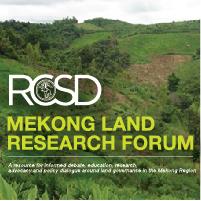Resource information
Land is the repository of memory and keeps traces of the past in the absence of a strong written tradition. It is perceived as an open book from which anyone can read and learn about local history: place names, old roads, legends and stories attached to places. For local people, bulldozing the landscape is seen as erasing their history, and disturbing social organisations and traditions. In Cambodia--as in many other countries--land is an extremely important economic resource and asset. Land is livelihood. But equally, land is valued as an emblem of rootedness, belonging and stability, and is widely regarded as the very basis of social organisation in the country. In fact for most Cambodians, land is considered to be the foundation of society and life. A family's attachment to its piece of land has particular significance in a society that over the past hundred years has hurtled through successive periods of civil conflict, war, massive displacement, forced collectivisation and genocide, and finally into an unregulated, capitalist, market economy. Today, at least a third of Cambodia's peoples—rural and urban--are being systematically alienated from their lands, homes and livelihoods. In many instances communities are losing lands and access to natural resources because of economic and demographic pressures. But equally, people are being dispossessed from their lands by those with political power and money. This is made possible by a combination of factors: economic opportunism by the country's elites and their external allies and their impunity from legal action; ambiguous land laws; a judicial system that is hostage to political and financial power and unable to protect the rights of citizens; short-sighted economic development plans that seek to usher in private capital at any cost, and; shocking apathy by bilateral and multilateral donors and creditors, who are willing to turn a blind eye to massive land and resource thefts. This paper attempts to provide an overview of the growing crisis of land and resource alienation in Cambodia. The paper is based on secondary data, travel and observation in the Cambodian countryside, and personal interviews with representatives from rural communities, Non-Governmental Organisations (NGOs) and research organisations.


